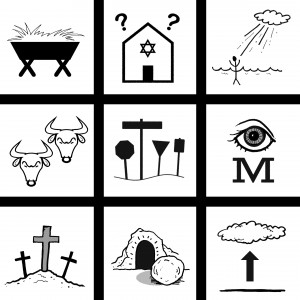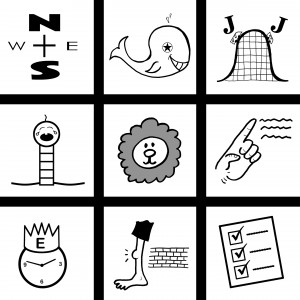 As we move into chapter five, let’s backtrack briefly. So far, we have examined the Bible in chronological order from Genesis to Malachi in the Old Testament (the part of the Bible before Jesus comes on the scene, covering the period from 4000 B.C. to 400 B.C.). Before we move into the New Testament and look at Jesus, the church, and the end of time, it would be helpful to look at several books that deal with doubt.
As we move into chapter five, let’s backtrack briefly. So far, we have examined the Bible in chronological order from Genesis to Malachi in the Old Testament (the part of the Bible before Jesus comes on the scene, covering the period from 4000 B.C. to 400 B.C.). Before we move into the New Testament and look at Jesus, the church, and the end of time, it would be helpful to look at several books that deal with doubt.
The Bible helps us vent our emotions in the face of evil. Books like Psalms, Habakkuk, Job, Ruth, and Lamentations offer us contemplative views of the soul and its yearnings. In them we see the broken heart free to mourn, doubt, cry, and even wail. The Bible says we are living in a battle zone of good and evil, justice and injustice, love and hate, truth and lies. Being in the battle can result in bad things happening to anyone, even those who love God. The Bible gives us freedom to wrestle with Him as we compare this broken world to the one for which we were created. God also offers us hope that He will one day return and permanently repair this broken world.
We begin in the book of Job (pronounced Jobe), depicting a series of events that occurred in the early days of Genesis. We meet a man who’s in the local news as a leader, giver, philanthropist, family man, business owner, and

man of faith. His front-page status even grabbed God’s attention. God was so impressed that He bragged about Job in heaven. “Have you considered My servant Job?” He said during one of these bragging sessions. A debate ensued in Heaven between good and evil. God’s Adversary doubted Job’s devotion. Evil contended that no one helps others unless they “get something out of it.” So a debate ensued between God, the loving generous One, and Evil, the selfish taker. What’s at the center of the universe: selfishness or love? To test this question, good and evil staged an experiment on Job. God allowed Job to be tested, but not harmed physically.
In one day, Job received more bad news than any human could imagine. Like a newspaper delivered every hour, Job received a parade of shocking, horrific news. In page after page he learned that his cattle and farms had been taken. He found out that his family had been killed. Everything Job held dear fell apart in one dreadful day.
As this cosmic play built to a climax, the audience watched Job’s reaction. Will he thank God for the time he had with his riches and children, or curse God for not giving him more time? Will he curse God, or cling to Him? Job refused to curse God. He fell to his knees in tears, trying to cope with the deep darkness that had come upon him. In

the midst of the pain, he worshiped. He clung to God as his source of comfort. He realized that only God could help him make sense of this tragedy. He relied on God as the only one who could make good out of bad. As we listen in, we hear Job say, “Blessed be the name of the Lord. He gives and takes away.” The Evil One was not impressed.
Evil restated his assertion that everyone is inherently selfish. Evil suggested that Job was clinging to God in the midst of tragedy because “at least he had his health.” God allowed Evil to affect Job’s health, but not to kill him. Job was again on the receiving end of pain and difficulty. How would he respond? Would he curse God? This time Job came close: he cursed the day he was born. The long-term health problems combined with the emotional distress of losing his family, business, and riches was too much to bear. Job’s wife, who was also suffering great pain, finally cried out in exasperation, “Job, curse God and die.” But Job refused, clinging tirelessly to his God instead.
The next 30 chapters of Job play out as a conversation between Job and his “friends.” These four friends came to comfort Job in his pain. They began by silently sitting with Job and mourning with him. For seven days they sat, listened, and entered into Job’s pain. These “sitting sevens” became a pattern for comforting others for centuries to come. The problem occurred when the friends decided to open their mouths and explain the problem of evil to Job. Job’s friends believed in the doctrine of “boomerang retribution,” otherwise known as karma. They believed that “bad things happen to bad people” and “good things happen to good people.” Karma helped them rationalize the cause of these tragic events. They pointed their fingers at Job, saying God was angry at him. Surely Job’s sins must have caused these tragedies. They even had the gall to tell Job that his children had died because they were bad. Layers of guilt were dumped on Job, who was not only in pain, but now trying to fight against the guilt of this notion of karma.
Job argued that suffering is real, not an illusion, as Buddhism teaches today. Job argued that suffering is wrong, not normal, as Naturalism teaches. Job argued that suffering is not karma, as Hinduism and his friends believed. Job couldn’t explain why he was suffering, but he knew that it was not karma. The Bible teaches that suffering is caused by a broken creation. Our broken world is not in alignment with its Creator. The darkness released by Adam and Eve affected everything. There are dark forces in the spiritual realm that affect mankind. There is darkness in each of us that causes us to do what we don’t want to do. There is darkness that fills the hearts of others’ evil actions. There is darkness that causes the world to spit out Earthquakes, tsunamis, and suffering. Job realized that the problem of evil and suffering is not always as simple as “it’s your fault.”
The finger pointing at Job continued chapter after chapter. Finally, God showed up in a whirlwind. How did God

explain Himself to Job? How did God solve the puzzle of pain? Would God pull back the curtain of eternity and let Job see into the wings? No. God came down to Job to give him what he asked for – an audience with his Creator. God began by not answering, but asking questions. For two chapters God asked Job questions about how the Earth was made, where light comes from, and how the animals got their instincts. God bombarded Job with questions designed to humble him and remind him that he didn’t know as much as he thought. Job covered his mouth and fell to his feet. Job had seen God and realized that he had been presumptuous to think that he knew all the facts. He realized, “Who am I to correct God?” Job realized that God really is wise, powerful, and all-knowing. Job saw the extent of God’s love for creation. God reminded Job that He sees the deer giving birth, the cloud that rains on unseen land, and the silly ostrich running across the plain. While God never answered Job’s questions directly, God revealed that He can be trusted during tragedy. God confirmed that karma is wrong. God reminded Job that He was steadfast and loved him dearly.
Job’s friends felt justified. They thought they were right: Job was arrogantly trying to boss God around. God rebuked them for their poor theology, which was inappropriately placed into Job’s life. God confirmed that Job was right. In the mysteries of this broken world, sometimes bad things happen to “good” people. In this sliver of time we live in now, good things even happen to bad people occasionally. God reminded them that He will set all things right. He will judge the evil doer and He will reward the good. God was not happy with Job’s friends. God humbled these “experts” by telling them they can only find forgiveness if Job, the righteous man, prayed for them. Job’s humility and forgiving attitude was on display again as he forgave his friends, prayed for their forgiveness, and suggested they cling to God in adversity themselves. God honored Job’s clinging by restoring his fortune and health, and blessed him with more children. Job showed us that evil and pain are complicated, but the only way to push through the pain is by clinging to the source of hope.
Here is a live teaching of Fast Track (Job, Ruth, Lamentations, Psalms):
For a free session of Godonomics, visit: http://www.godonomics.com/watch-session-5

